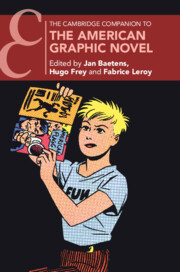Book contents
- The Cambridge Companion to the American Graphic Novel
- The Cambridge Companion to the American Graphic Novel
- Copyright page
- Contents
- Figures
- Contributors
- Editors’ Acknowledgments
- Introduction
- Part I History and Genre
- 1 The “First” Graphic Novel in America
- 2 The Mad-Men Generation
- 3 From Justin Green and Art Spiegelman to Alison Bechdel
- 4 Graphic Journalism
- 5 “Great” American Graphic Novels
- 6 Crime
- 7 Superheroes in Graphic Novels
- 8 Science Fiction and Fantasy
- 9 “Scared Witless”
- Part II Graphic Novels and the Quest for an American Diversity
- Index
- Cambridge Companions To …
- References
7 - Superheroes in Graphic Novels
from Part I - History and Genre
Published online by Cambridge University Press: 10 January 2024
- The Cambridge Companion to the American Graphic Novel
- The Cambridge Companion to the American Graphic Novel
- Copyright page
- Contents
- Figures
- Contributors
- Editors’ Acknowledgments
- Introduction
- Part I History and Genre
- 1 The “First” Graphic Novel in America
- 2 The Mad-Men Generation
- 3 From Justin Green and Art Spiegelman to Alison Bechdel
- 4 Graphic Journalism
- 5 “Great” American Graphic Novels
- 6 Crime
- 7 Superheroes in Graphic Novels
- 8 Science Fiction and Fantasy
- 9 “Scared Witless”
- Part II Graphic Novels and the Quest for an American Diversity
- Index
- Cambridge Companions To …
- References
Summary
This chapter deals with a genre that, at first sight, clashes with both the major themes and the publication format of the graphic novel: superhero comics. However, the history of the graphic novel demonstrates that it cannot be completely separated from superhero comics. Some important forerunners of the graphic novelists have had long careers in producing superhero comics, and some of their works went far beyond the standards of comics publication in the 1960s and 1970s. Moreover, when the graphic novel gradually consolidated, comics publishers such as Marvel began to adopt the format and to use the direct market system as a response to the decline of comic book distribution. The chapter offers a close analysis of two graphic novels that had superheroes at their core: Batman: The Dark Knight Returns (Miller) and Watchmen (Moore and Gibbons). It gives an overview of the imitations and continuations of these books, with a special look at Eddie Campbell’s “Graphic Novel Manifesto” (2004). It concludes with a case study of the Batman universe.
Keywords
- Type
- Chapter
- Information
- The Cambridge Companion to the American Graphic Novel , pp. 122 - 138Publisher: Cambridge University PressPrint publication year: 2023

